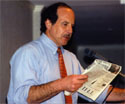Summer 1999
Pew/IRE Workshop, Baltimore
From April 9-11, about 70 journalists met in Baltimore for “Journalists: Custodians or Catalysts for the Community?” – a workshop co-sponsored by the Pew Center and IRE. Some highlights:

Bill Marimow, Managing Editor, Baltimore Sun, and evening keynoter: “Good journalists need to do both: Be a watchdog and become catalysts for change.”
Frank Denton, Editor, Wisconsin State Journal: “Americans’ sense of community is not dead. It’s just latent. People are not apathetic, just alienated.”…The overprofessionalization of journalism “results in a higher quality of journalism but increasing isolation from the people you serve.”
Barbara Walsh, Reporter, Portland (ME) Press Herald, had to create her own databases from medical examiners’ reports, hospital emergency rooms and fatal fire records to produce the award-winning series: “The Deadliest Drug: Maine’s Addiction to Alcohol.”
“Fifty percent of Mainers were dying in fatal fires because of alcohol. The Fire Department was fed up.”
Robert Benjamin, Maryland Editor, Baltimore Sun, followed up “Reading by 9,” with “Cracking the Code,” which chronicled the journey of a first-grade class learning to read. “We didn’t approach the story as an outrage, an urban pathology. What we focused on was what could be changed and controlled, which was reading instruction, and how it was affected by public policy.”

Ted Glasser, co-author, “Custodians of Conscience” and luncheon keynoter.
“Every investigation must be understood as a call to the conscience of the community.
“…Investigative journalism is journalism that tries to make the world better, not simply make a difference. That brings investigative journalism directly into contact with morality and that makes us uncomfortable because we are supposed to be disinterested, disengaged.
“It’s always the journalist who defines what the moral consensus is: How bad it is. All stories, particularly investigative journalism, have a moral agenda. You can’t use language as journalists do and claim to be morally disengaged.”
Jane Stevens, Berkeley Media Studies Group’s Violence Project. “What happens when you replace the justice, prosecutors, perspective with a public health perspective?”
